Types of Green Leafy vegetables and their nutritional values for 100 grams
Fenugreek:
Fenugreek (Trigonella foenum-graecum L.) is a leafy vegetable belonging to the Leguminaceae family. It is also used as cattle fodder.
Fenugreek called with different names in other Indian languages: Methi, Fenugreek, Methya, Menthya, Yendayam
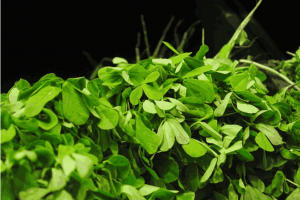
Fenugreek Nutritional Values for 100grams:
- Calories: 49
- Water: 86.1%
- Protein: 4.9 grams
- Fat: 0.9 grams
- Carbohydrates: 6.0 grams
- Calcium: 395 grams
- Iron: 25.5 grams
- Vitamin ‘C’’B’: 0.350 mgrams
- Vitamin ‘C’: 52 mgrams
- Carotene: 2340 mgrams
Spinach:
It is related to quinoa and beets and is belongs to the amaranth family and it’s considered very healthy, as it’s loaded with nutrients and antioxidants. Taking spinach may improve eye health, reduce oxidative stress, reduce cancer risk, and lower blood pressure.
Spinach called with different names in other Indian languages: Palakura, Keerai
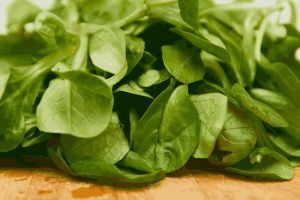
Spinach Nutritional Values for 100grams:
- Calories: 26
- Water: 92.1%
- Protein: 2.0 grams
- Fat: 0.7 grams
- Carbohydrate: 2.9 grams
- Calcium: 190 grams
- Iron: 17.4 grams
- Vitamin ‘C’’B’: 0.16 grams
- Vitamin ‘C’: 25 mgrams
- Carotene: 7180 mgrams
Radish Leaves:
Radish leaves are rich in minerals and vitamins. Many of us are not aware of benefits of this and ignore, But this helps in increasing immunity and lot other health conditions.
Radish called with different names in other Indian languages: White Radish, Red Radish Globe, Mooli, mullangi, daikon radish, oriental radish
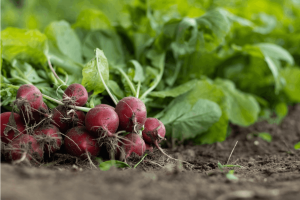
Radish Leaves Nutritional Values for 100grams:
- Calories: 28
- Water: 90.8%
- Protein: 3.8 grams
- Fat: 0.4 grams
- Carbohydrate: 2.4 grams
- Calcium: 265 grams
- Iron: 3.6 grams
- Vitamin ‘C’’B’: 0.65 grams
- Vitamin ‘C’: 81 mgrams
- Carotene: 5295 mgrams
Spring Onions:
Spring onions are a leafy vegetable related to others in the Allium family, such as garlic, chives, and onions.
Spring Onion called with different names in other Indian languages: Scallions, Green onion, kanda, gundhun, Pallari vengayam, Cheriya ulli, ulli paraka
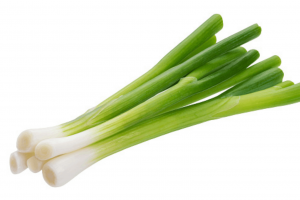
Spring Onion Nutritional Values for 100grams:
- Calories: 41
- Water: 87.6%
- Protein: 0.9 grams
- Fat: 0.2 grams
- Carbohydrate: 8.9 grams
- Calcium: 50 grams
- Iron: 7.5 grams
- Vitamin ‘C’’B’: 0.03 grams
- Vitamin ‘C’: 17 mgrams
- Carotene: 595 mgrams
Moringa Leaves:
Moringa leaves find many uses in Indian cuisine as they are versatile and can be incorporated into the diet in many ways. Adding them to juices and using them as stir-fry vegetables are the most common ways in which they are eaten.
Moring leaves called with different names in other Indian languages: Saijna, Drumstick tree, mulaga, moringa
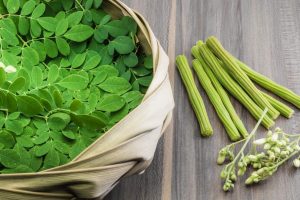
Moringa Leaves Nutritional Values for 100grams:
- Calories: 92
- Water: 75.9%
- Protein: 6.7 grams
- Fat: 1.7 grams
- Carbohydrate: 12.9 grams
- Calcium: 440 grams
- Iron: 7.0 grams
- Vitamin ‘C’: 220 mgrams
- Carotene: 6780 mgrams
Amaranth:
Amaranths are a very important part of a balanced diet. It is rich in proteins, salts, calcium, iron, vitamin ‘A’ and ‘C’.
Amaranth called with different names in other Indian languages: Chaulai Sag, Mullu Keerai, Cheera, ainthan, Thotakura, mulaikkira
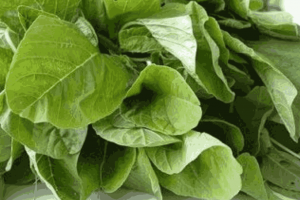
Amaranth Nutritional Values for 100grams:
- Calories: 45
- Water: 85.7%
- Protein: 4.0 grams
- Fat: 0.5 grams
- Carbohydrate: 6.1 grams
- Calcium: 395 grams
- Iron: 25.5 grams
- Vitamin ‘C’’B’: 0.33 grams
- Vitamin ‘C’: 99 mgrams
- Carotene: 5520 mgrams
Sorrel Leaves:
Tender leaves and branches are used as leafy vegetable. The leaves are sour and contain many nutrients.
Sorrel(Gongura) called with different names in other Indian languages: Gongura, Pulicha Keerai, Pandi, Pitwaa, Ambada
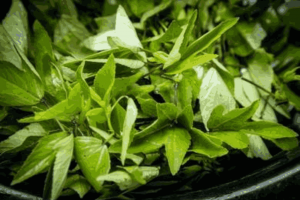
Sorrel leaves Nutritional Values for 100grams:
- Water: 85.1%
- Protein: 1.7 grams
- Fat: 1.1 grams
- Carbohydrate: 9.9 grams
- Calcium: 172 grams
- Iron: 2.3 grams
- Vitamin ‘C’’B’: 0.46 grams
- Vitamin ‘C’: 20 mgrams
- Carotene: 6970 mgrams
Coriander:
Coriander (Coriandrum sativum L.) is one of the most ancient spices cultivated in our country. Coriander has many medicinal values.
Coriander called with different names in other Indian languages: Chinese parsley, dhania or cilantro, kothimera
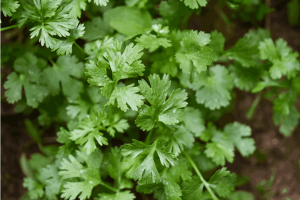
Coriander Nutritional Values for 100grams:
- Calories: 44
- Water: 86.3%
- Protein: 3.3 grams
- Fat: 0.6 grams
- Carbohydrate: 6.3 grams
- Calcium: 184 grams
- Iron: 18.5 grams
- Vitamin ‘C’’B’: 0.11 grams
- Vitamin ‘C’: 135 mgrams
- Carotene: 6918 mgrams
Malabar Spinach:
Malabar spinach is an excellent source of iron, calcium, Vitamin C and Vitamin A. It contains high protein and great source of phosphorus and potassium. It has great amount of antioxidants such as lutein and beta carotene.
Malabar Spinach called with different names in other Indian languages: Bachhali, Poi saag, Kodi Pasalai
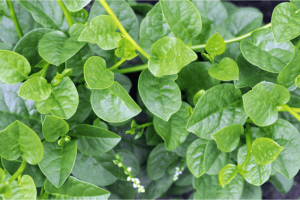
Malabar Spinach Nutritional Values for 100grams:
- Water: 93.0%
- Protein: 1.2 grams
- Calcium: 150 grams
- Iron: 1.4 grams
- Vitamin ‘C’: 86 mgrams
- Carotene: 3250 mgrams
Spinach Dock:
Spinach dock is a European vegetable with a lush green appearance. It has a citrus, biting flavor. Garden sorrel, also known as common sorrel, is a perennial herb.
Spinach dock called with different names in other Indian languages: Chukkakura, Khatta palak, Ambat chukka and Green sorrel
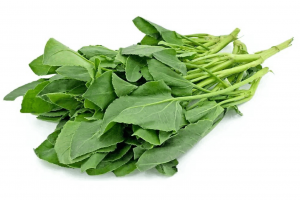
Spinach Dock Nutritional Values for 100grams:
- Calories: 15
- Water: 95.2%
- Protein: 1.6 grams
- Fat: 0.3 grams
- Carbohydrate: 1.4 grams
- Calcium: 63 grams
- Iron: 8.7 grams
- Vitamin ‘C’’B’: 0.09 grams
- Vitamin ‘C’: 12.0 mgrams
- Carotene: 3660 mgrams
Mint:
Mint (Mentha viridis L.) is a medicinal plant belonging to the mint ‘Labiati’ family. Mint has good nutritional value owning to the number of dietary components present. Moreover, it is a good source of many micronutrients and macronutrients.
Mint called with different names in other Indian languages: Mentha , Pudina, Spearmint
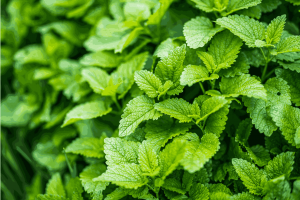
Mint Nutritional Values for 100grams:
- Calories: 48
- Water: 84.9%
- Protein: 4.8 grams
- Fat: 0.6 grams
- Carbohydrate: 5.8 grams
- Calcium: 200 grams
- Iron: 15.6 grams
- Vitamin ‘C’’B’: 0.31 grams
- Vitamin ‘C’: 27 mgrams
- Carotene: 1620 mgrams
Curry Leaves:
Curry leaf (Murraya koenigii L.) are a leaf that we use every day to add flavor to every curry, it is very good for health. They are rich in medicinal, nutraceutical properties and even have cosmetic uses.
Curry leaf called with different names in other Indian languages: Karivepaku, Kadi Patta, Karibevu, Karuvepillai
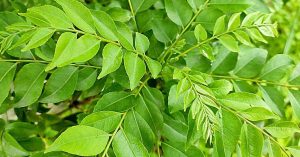
Curry Leaf Nutritional Values for 100grams:
- Water: 63.8%
- Protein: 6.1 grams
- Fat: 1.0 grams
- Carbohydrate: 18.7 grams
- Calcium: 290 grams
- Iron: 20.1 grams
- Vitamin ‘C’’B’: 0.09 grams
- Vitamin ‘C’: 4 mgrams
- Carotene: 7560 mgrams
Taro Leaves:
Taro leaves are the heart-shaped leaves of the taro plant (Colocasia esculenta), commonly grown in subtropical and tropical regions.
Taro leaves called with different names in other Indian languages: Chama, arbi, kochu, chembu

Taro leaves Nutritional Values for 100grams:
- Calories: 56
- Water: 82.7%
- Protein: 3.9 grams
- Fat: 1.5 grams
- Carbohydrate: 6.8 grams
- Calcium: 227 grams
- Iron: 10.0 grams
- Vitamin ‘C’’B’: 0.22 grams
- Vitamin ‘C’: 12 mgrams
- Carotene: 10278 mgrams
Follow WalPencil to get to know cultivation tips for other vegetable crops like vegetables and their nutritional values , Radish, Coriander, Fenugreek, Mint etc.
